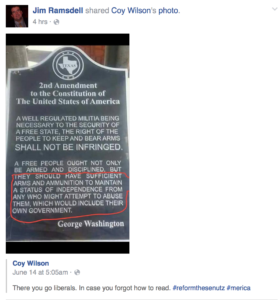The apparent hallmark of the proud and the stupid with respect to the 2nd Amendment is the flashing of the plaque displayed here (together with the typically associated hashtags).
 Of course, Washington never said that. What he did say was:
Of course, Washington never said that. What he did say was:
Among the many interesting objects, which will engage your attention, that of providing for the common defence will merit particular regard. To be prepared for war is one of the most effectual means of preserving peace.
A free people ought not only to be armed but disciplined; to which end a Uniform and well digested plan is requisite: And their safety and interest require that they should promote such manufactories, as tend to render them independent on others, for essential, particularly for military supplies.
The proper establishment of the Troops which may be deemed indispensible, will be entitled to mature consideration. In the arrangements which may be made respecting it, it will be of importance to conciliate the comfortable support of the Officers and Soldiers with a due regard to œconomy.
There was reason to hope, that the pacific measures adopted with regard to certain hostile tribes of Indians would have relieved the inhabitants of our Southern and Western frontiers from their depredations. But you will percieve, from the information contained in the papers, which I shall direct to be laid before you (comprehending a communication from the Commonwealth of Virginia) that we ought to be prepared to afford protection to those parts of the Union; and, if necessary, to punish aggressors.
As a nouveau aristocrat, Washington despised the useless rabble, and useless was largely what the rabble was, which is in no small way the reason why Washington insisted on a regular army (consistent with the provisions of Article I Section 8 of the Constitution).
Perhaps the 2nd Amendment whiner who argued “There you go liberals. In case you forgot how to read. #reformthesenutz #merica” with respect to such plaques should have a look at the Common Core provisions regarding close reading and critical thinking…
From George Washington to the United States Senate and House of Representatives, 8 January 1790 – http://founders.archives.gov/documents/Washington/05-04-02-0361
The State Militant; militia in the 21st century https://opinion.alaskapolicy.net/pardonme/?p=109

 The U. S. Constitution is essentially a side of mutton (that being the nature of parchment); it lays around like a dead sheep and doesn’t do much at all. Tough to do much when you are housed in a bullet proof glass case, after all.
The U. S. Constitution is essentially a side of mutton (that being the nature of parchment); it lays around like a dead sheep and doesn’t do much at all. Tough to do much when you are housed in a bullet proof glass case, after all.
 Cologne Bike Highways
Cologne Bike Highways